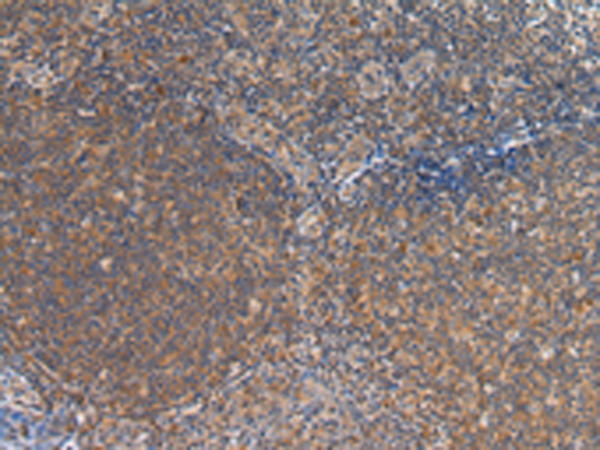
| WB | 咨询技术 | Human,Mouse,Rat |
| IF | 咨询技术 | Human,Mouse,Rat |
| IHC | 1/25-1/100 | Human,Mouse,Rat |
| ICC | 技术咨询 | Human,Mouse,Rat |
| FCM | 咨询技术 | Human,Mouse,Rat |
| Elisa | 1/2000-1/5000 | Human,Mouse,Rat |
| Aliases | FS |
| Host/Isotype | Rabbit IgG |
| Antibody Type | Primary antibody |
| Storage | Store at 4°C short term. Aliquot and store at -20°C long term. Avoid freeze/thaw cycles. |
| Species Reactivity | Human, Mouse, Rat |
| Immunogen | Synthetic peptide of human FST |
| Formulation | Purified antibody in PBS with 0.05% sodium azide and 50% glycerol. |
+ +
以下是关于FST(卵泡抑素)抗体的3篇代表性文献摘要:
---
1. **文献名称**:*Targeting Follistatin by Antibody Therapy Increases Muscle Mass in Mice*
**作者**:Sako D, et al.
**摘要**:该研究开发了一种特异性抗FST单克隆抗体,通过阻断FST与肌肉抑制素(myostatin)的相互作用,显著促进了小鼠骨骼肌的生长和再生,为治疗肌肉萎缩疾病提供了潜在策略。
---
2. **文献名称**:*Follistatin Antagonizes Ovarian Cancer Progression by Inhibiting Metastasis and Angiogenesis*
**作者**:Robertson DM, et al.
**摘要**:研究利用抗FST抗体在卵巢癌模型中抑制肿瘤转移,发现其通过下调血管生成因子(如VEGF)和抑制上皮-间质转化(EMT),显著减缓了肿瘤进展。
---
3. **文献名称**:*Monoclonal Antibody Against Follistatin Improves Glucose Tolerance in Obese Mice*
**作者**:Lee SJ, et al.
**摘要**:该研究显示,抗FST抗体通过调节脂肪组织代谢和胰岛素敏感性,改善了肥胖小鼠的血糖控制,提示FST抗体在代谢综合征治疗中的潜力。
---
这些文献涵盖了FST抗体在肌肉再生、癌症治疗和代谢疾病中的关键应用,展示了其多方面的研究价值。如需具体文献来源,可进一步提供DOI或PubMed检索号。
**Background of FST (Follistatin) Antibodies**
Follistatin (FST), a glycoprotein encoded by the *FST* gene, plays a critical role in regulating cellular processes by binding and neutralizing members of the TGF-β superfamily, particularly activins and bone morphogenetic proteins (BMPs). It modulates signaling pathways involved in muscle growth, follicular development, and metabolic regulation. FST exists in multiple isoforms (e.g., FST315. FST288) due to alternative splicing, each exhibiting distinct biological activities and tissue-specific expression.
FST antibodies are essential tools for studying its expression, localization, and function. They enable detection of FST in immunoassays (e.g., Western blot, ELISA, immunohistochemistry) and are used to investigate its role in diseases such as muscle atrophy, cancer, and reproductive disorders. For instance, FST overexpression is linked to muscle hypertrophy, while its inhibition may influence tumor progression. Therapeutic applications are also emerging, with FST-neutralizing antibodies explored for conditions like cancer cachexia or fibrosis.
Researchers prioritize antibodies targeting specific FST isoforms or domains to ensure experimental precision. Validating antibody specificity remains crucial, as cross-reactivity with related proteins (e.g., follistatin-like 1) can skew results. Overall, FST antibodies are pivotal in unraveling the protein's diverse roles and advancing translational research in regenerative medicine and disease treatment.
×